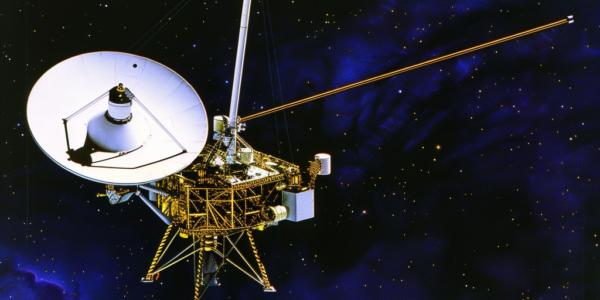Mars influencing Earth’s deep oceans with ‘giant whirlpools,’ scientists say
New research suggests that Mars may be influencing deep ocean currents on Earth, leading to the formation of ‘giant whirlpools.’ Scientists analyzed sediments to look back tens of millions of years into Earth’s past, revealing 2.4 million-year climate cycles linked to the interactions of Mars and Earth orbiting the Sun. This phenomenon, known as ‘resonance,’ affects the shape of their orbits and translates to periods of increased solar energy and warmer climate on Earth, correlating with more vigorous ocean currents. However, these natural climate cycles are not linked to the rapid heating the world is experiencing today due to human activities. The study’s findings provide valuable insights into the forces driving deep ocean currents and their impact on the Earth’s climate.
Earliest Known Fossilized Forest Discovered in South West England
Scientists have made a groundbreaking discovery in the cliffs on the coast of South West England. They believe they have found the world’s earliest known fossilised forest near Minehead, Somerset. The discovery, made by researchers from Cambridge and Cardiff Universities, is said to be the oldest fossilised trees ever found in Britain and the oldest known forest on Earth. The fossilized trees, known as calamophyton, are said to resemble palm trees and are considered a ‘prototype’ of today’s trees. Some of the largest trees found were between two and four meters tall. The researchers also identified fossils of plants, debris, tree logs, and traces of roots, providing valuable insights into how early trees shaped landscapes and stabilized riverbanks and coastlines millions of years ago.
Upcoming Total Solar Eclipse in 2024 Captures Attention and Prompts Trip Planning
The upcoming total solar eclipse on April 8, 2024, has captured the attention of millions as it promises to be an extraordinary astronomical event. This rare occurrence is generating widespread interest and prompting people to plan trips to witness this awe-inspiring phenomenon. What makes this total solar eclipse particularly compelling is its accessibility to a larger population in the United States compared to previous eclipses. The 2024 eclipse is anticipated to be even more captivating due to differences in its path, timing, and potential for scientific research, as highlighted by NASA.
Unprecedented Warmth in Northern Hemisphere Oceans Raises Concerns
Recent studies have shown unprecedented warmth in the oceans of the Northern Hemisphere, with sea-surface temperatures in the North Atlantic averaging around 68 degrees Fahrenheit, a highly unusual figure for this time of year. 41 percent of the global ocean experienced heat waves in January, indicating a concerning trend. Research indicates that by the end of the century, a significant portion of the ocean could be in a permanent heat wave state, with potential consequences including stronger hurricanes, rising sea levels, and unsustainable conditions for marine life.
America Gears Up for Rare Total Solar Eclipse on April 8, 2024
Get ready for the total solar eclipse on April 8, 2024, visible in parts of Mexico, Canada, and 14 U.S. states. Make sure to have solar glasses for safe viewing!
Lunar Eclipse Coincides with Holi, India’s Festival of Colours
This year’s first lunar eclipse coincides with India’s Holi festival, but the eclipse won’t be visible in India. Skywatchers in parts of Europe, the US, and Japan will be able to see the penumbral lunar eclipse on March 25th. The eclipse won’t impact Holi rituals in India due to its lack of visibility.
NASA Reports Serious Issue with Voyager 1, Farthest Man-Made Object in Space
NASA reported that Voyager 1, the farthest man-made object in space, has encountered a serious issue, leading to the loss of its ability to send engineering and science data back to Earth. The recent malfunction in Voyager 1’s computer system has raised concerns at NASA, posing a significant challenge for the continuation of the mission. If the issue persists, it could mark the end of an era for Voyager 1, signifying the conclusion of an extraordinary journey that has contributed immensely to scientific knowledge and inspired countless individuals to explore the cosmos.
Satellite Disposal and Environmental Concerns
SpaceX plans to dispose of 100 Starlink satellites due to a design flaw, raising concerns about the environmental impact of burning up satellites in the atmosphere. With the increasing congestion of low earth orbit, the space sector is prioritizing debris clearing and controlled re-entry of spacecraft to minimize environmental impact.
Earth’s Crust Flipped Upside Down Beneath Mediterranean
Earth’s crust has flipped upside down beneath the Mediterranean as Africa and Eurasia collide, leading to rare, deep earthquakes in Spain. Geologists suggest that the capsized tectonic slab may be responsible for the seismic activity. The sinking of the Mediterranean floor beneath Europe is causing the crust to become more prone to earthquakes, as explained by a new study.
Physical Limitations May Prevent Alien Civilizations from Space Exploration, New Study Suggests
Alien civilizations may be facing a significant barrier to space exploration, according to a new article published in the Journal of the British Interplanetary Society. The article suggests that physical limitations may be preventing extraterrestrial beings from leaving their home planets, adding a fascinating twist to the ongoing search for intelligent alien life. The implications of these proposed limitations are thought-provoking, raising questions about the possibility of unaware aliens residing within massive oceans or civilizations struggling to break free from the immense gravitational forces of their planets.










